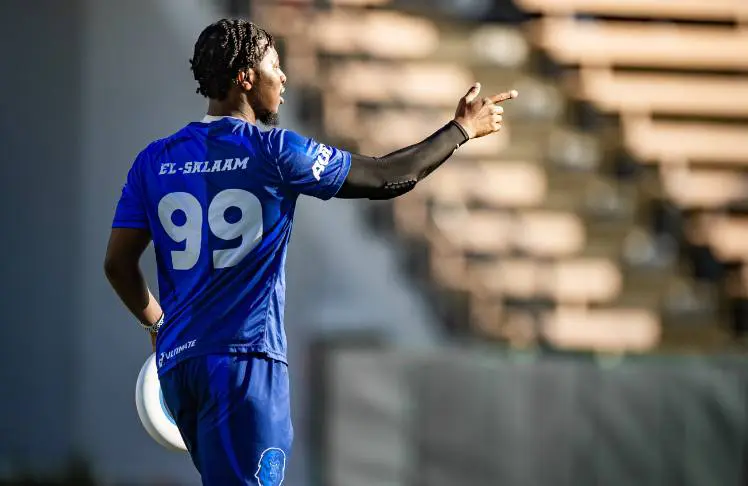
By Gabriella Wider, The Seattle Medium
Khalif El-Salaam has made a name for himself in the Ultimate community–from the start of his Ultimate career at Mercer Middle School in Beacon Hill to winning a World Games gold medal in 2022, the game’s highest level.
Recruited in middle school to play Ultimate with his friends at the time, El-Salaam began his career as a hypercompetitive athlete, drawn to winning and excelling in his sport.
Ultimate Disc, often simply called “Ultimate,” is a fast-paced, non-contact team sport played with a flying disc or Frisbee. Players strive to score points by passing the disc to teammates and then catching it in the opposing team’s end zone.
El-Salaam plays professionally for the Seattle Cascades team during the winter and spring seasons. In addition to the World Games honor, he has been on teams that have won the U.S. World Championships five times.
As an accomplished professional Ultimate player, El-Salaam hopes to be a role model and resource for young Black athletes playing sports in predominantly white communities, which is something he experienced coming up.
In 2016 and 2017, El-Salaam was voted among the top five NCAA Ultimate players and helped the University of Washington’s Ultimate team compete at nationals. The UW team made it to the quarter-finals during El-Salaam’s senior year.
During college, El-Salaam was also driven to get his image in the media to showcase his talents as an athlete. PR and marketing help athletes get noticed by the U.S. national teams.
“There was no media of Black people being successful in the sport of Ultimate, and I wanted to celebrate myself and make it onto U.S. national teams, and to do that, they need to know who you are. So a lot of the time, it was just me creating media for myself that other people can now see.”
Shanye Crawford is the founder of Discover Diversity, an organization that facilitates conversations on racial equity in predominantly white sporting communities, such as the Ultimate community. Her organization also provides support and resources for athletes of color. This work, her passion for the sport of Ultimate, and her experience as a player brought her to El-Salaam.
“The heights he ascended to in our predominantly white sport is amazing. And I think it speaks entirely to his skill, dedication, body maintenance, and how he coaches the youth,” says Crawford when describing El-Salaam.
Crawford admires El-Salaam’s passion for the sport and his support for fellow athletes. “I love this guy; he is, to me, a fan of the sport. I think that is the biggest thing about him, and his genuine love for the game causes him to work like crazy for himself.”

As a Black athlete in a predominantly white sport, El-Salaam has faced prejudice and discrimination throughout his career.
“I spent a lot of time in my career being ostracized or condemned for celebrating in a specific way or handling situations in a specific way or speaking in a specific way that really scarred me over time,” says El-Salaam.
Often, when white people catch the disc, spike it into the ground, and scream in celebration, they are labeled as intense, fiery and inspirational. As a Black athlete, El-Salaam was seen as hyper-aggressive, arrogant or egotistical.
“Not only was I criticized for celebrating differently than others, but I was also oftentimes judged based off of just predispositions of what Blackness is and the aggression that people push into our narrative,” says El-Salaam.
He does not believe the racist behavior has necessarily changed, but he says the conversation around racism and bias toward Black and other athletes of color has come to light. He does believe white people are more likely now to take accountability for their actions; however, the racist actions and reactions continue, he says.
“I recognized that a hefty majority of the people in the spaces that I occupy don’t look like me, don’t sound like me, don’t react like me, and don’t celebrate like me. Coming into my adulthood, I’m recognizing that it is okay for me to be Black in white spaces,” says El-Salaam.
El-Salaam hopes to be a resource and role model for young athletes of color. He encourages them to reach out to him because, growing up, he didn’t have a role model or anyone to look up to in the Ultimate community who shared the same background.
“Whether he is successful or not, he is authentically in celebration of his community,” says Crawford. “The guy is just different; you don’t see that often. You don’t see excellent players also celebrating other excellent players.”
Jonathan Helton, CEO of GamePoint Performance, an Ultimate training program designed to help athletes improve their skills year-round, is a former professional Ultimate player and former teammate and colleague of El-Salaam. He coached with El-Salaam.
“The kids are drawn to him because they want to be a great athlete like he is and because he is so accommodating and so extroverted; he carries a charisma that the kids are drawn to as well. He is very good at pumping them up and getting them excited about playing Frisbee,” says Helton.
Helton and El-Salaam coached youth athletes at the Competitive Ultimate Training camp, a program designed to help young Ultimate athletes across the nation.
“I’ll always make sure to give time to Black players who are up and coming who want to learn something, have questions, or need access to a resource or something like that. I think that it’s really important to be able to do that for our next generation of athletes,” says El-Salaam.